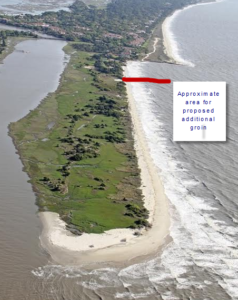Altamaha Riverkeeper News
Judge Approves Sea Island’s Proposed Groin…but that’s not the end.
By Jen Hilburn
Altamaha Riverkeeper
Georgia’s coast, its communities and its wildlife, suffered a blow recently when a judge decided to allow Sea Island to move forward with developing the groin along the spit.
We all benefit from the protection of our coastline from encroaching development that lacks the foresight of following the rules that guide those processes. We disagree with this decision and will be appealing the case to Fulton County Superior Court.
I wanted to take a moment to explain why Judge Miller of the administrative courts decided this way.
First, she argued that, although the current groins are adversely impairing the sand sharing system (she found our experts more reliable in that regard), she was not convinced that the proposed groin would have the same effect due to its design features such as adding a dune system and adding more sand, and because there are conditions in the permit to resolve any problems that may arise minimizing any adverse effects;
Secondly, although there may be adverse impacts on sea turtles, those impacts don’t rise to the level of being “unreasonable” given the small numbers of nests, that they can be relocated, and that the turtles themselves can find other nesting spots;
And lastly, with respect to our alternatives argument, (a) a groin, despite being recognized by SI’s own experts, the US Army Corps of Engineers, and every other expert in the world as a “shoreline stabilization device,” it is not such a device under the Shoreline Protection Act because the statutory language shows that the Georgia Legislature did not consider it to be such (and therefore, our alternative did not need to be considered).
However, this is not the end. Georgia’s Shore Protection Act provides that the public interest must be considered before a permit may be issued. One public interest factor is whether the proposed activity would unreasonably interfere with the conservation of marine life or wildlife. Expert testimony from two sea turtle experts, Mark Dodd in charge of Georgia DNR’s sea turtle conservation program, and Kirt Rusenko in charge of Boca Raton, Florida’s sea turtle conservation program established that the proposed groin would unreasonably interfere with conservation of threatened and endangered sea turtles.
The experts testified that the groin would unreasonably interfere with adult nesting females making it to the beach to lay their eggs, it would interfere with hatchlings trying to make it out to sea and it would concentrate predators of the baby sea turtles. This testimony was undisputed.
In reaching her decision to let the groin project proceed, the administrative law judge relied on testimony that there were usually less than three nests per year in the project area, that the nests could be relocated and that turtles stymied by the groin would look for another place to nest.
Experts for the Altamaha Riverkeeper were fully aware of this information but still concluded the adverse impacts from a groin would be unreasonable.
GreenLaw will continue to represent Altamaha Riverkeeper and Southern Environmental Law Center will represent 100 Miles in our appeal to Superior Court. The appeal will argue that the Administrative Law Judge failed to properly apply the requirements in the Shore Protection Act including failing to find that the groin would unreasonably interfere with endangered sea turtle conservation and that a reasonable and viable alternative, beach nourishment without a groin, is available. Under the SPA, beach nourishment without a shoreline stabilization device such as a groin is preferred over beach nourishment with a groin.
While the administrative law judge’s ruling was disappointing, it highlights the need for even more diligence in protecting Georgia’s amazing coast. Thanks to our members and supporters, Altamaha Riverkeeper has been working to protect our spectacular coastline for almost two decades.
For us to continue to be a strong advocate in the promoting and enforcing responsible coastal development, we need your help.
A $40 renewal of your membership or donation of $50, $100, $150, or more will ensure the organization is able to remain a stable voice for conservation and responsible Thank you for your continued support.
There are so many ways that you can help keep our rivers clean and beautiful. Responding to Action Alerts or reaching out to your elected representatives. Find your way to get involved!


